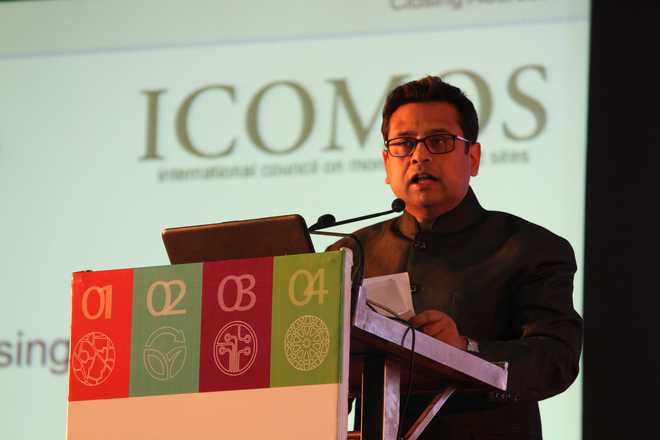
For a sound foundation: Jigyasu says that while India enjoys a rich heritage with many historic monuments, buildings and sites, these are fast deteriorating
Sarika Sharma
Cities are built by its people, by infrastructure and by services. But cities are built on their past. If not, what would Delhi be without Lal Qila; Jaipur without Hawa Mahal; and Chandigarh without Capitol Complex. It is with this very thought that the 19th General Assembly of the International Council on Monuments and Sites, better known as ICOMOS, met in Delhi. The assembly which was held in India for the first time in the 50 years of ICOMOS’ history, met to discuss people’s participation in cities of today, cities that we want to be smart and world class.
ICOMOS India is headed by Rohit Jigyasu, who hails from Chandigarh, and is the UNESCO Chair professor at the Institute of Disaster Mitigation for Urban Cultural Heritage at Ritsumeikan University, Kyoto. Based in Delhi, his expertise lies in disaster risk management and has worked on disaster risk management plans in the World Heritage sites of Khajuraho, Hampi, Konark, Red Fort, Jaisalmer Fort, Jantar Mantar and Ajanta & Ellora among others.
As head of ICOMOS India — the parent body being one of world’s biggest associations to work for the conservation and protection of cultural heritage places around the world — Rohit acknowledges that while India enjoys a rich heritage with many historic monuments, buildings and sites, these are fast deteriorating.
He says, in a fast changing world, conservation of these heritage buildings provides a sense of identity and continuity for future generations. Not only does it play a critical role in defining the landmark within the heritage area, it also generates economic return and supports the tourism industry. This makes it imperative for people to participate in conservation of their heritage, especially in urban areas.
Rohit says that for years the institutions responsible for our heritage have been exclusive. “Heritage is not just about archaeologists. Saving it needs as much participation from architects, historians and conservationists. Heritage can’t be elitist,” he asserts and insists on the importance of linking it to the common man. “Community participation is key to sustainable conservation.”
This is exactly why ICOMOS’ Delhi Declaration lists heritage not just as a fundamental right but as responsibility of all. “Heritage belongs to all people: men, women and children; indigenous people; ethnic groups; people of different belief systems; and minority groups. It is evident in places ancient to modern; rural and urban; the small, every day and utilitarian; as well as the monumental and elite. It includes value systems, beliefs, traditions and lifestyles, together with uses, customs, practices and traditional knowledge,” it mentions. A big question before ICOMOS India, in these polarised times, thus seems to be: How does it include all religions, ethnicities and castes in conservation activities. Rohit says they realise this and hope to work with government and private institutions towards this end.
For the times
At the moment, Indian cities seem set for an overhaul, courtesy Smart City Mission. In the urban renewal scheme of things, Heritage City Development and Augmentation Yojana (HRIDAY) is supposed to rejuvenate heritage. However, Rohit feels HRIDAY alone can’t help. “The scheme is there, but I don’t see a lot of money going into conservation of heritage. Unless this happens, Rohit feels that our smart cities won’t be sustainable. And that would be defeating the very idea behind having smart cities.
People’s participation
Complete access to heritage resources empowers people and communities to safeguard it, says ICOMOS’ Delhi Declaration. “Traditional knowledge and professional expertise constitute important resources for communities, adding to the understanding of values, sense of place, and awareness.” It says government has a responsibility to identify, assess and document heritage places and promote awareness of their significance. Access to both traditional knowledge and evidence-based documentation is fundamental to this approach.



























